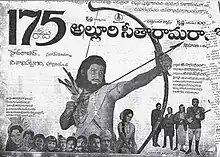| Alluri Seetarama Raju | |
|---|---|
 | |
| Directed by | V. Ramachandra Rao |
| Written by | Tripuraneni Maharadhi |
| Based on | Life of Alluri Sitarama Raju |
| Produced by | G. Hanumantha Rao Krishna (presenter) |
| Starring | Krishna Vijaya Nirmala Jaggayya |
| Music by | P. Adinarayana Rao |
Production company | |
Release date |
|
Running time | 187 minutes |
| Country | India |
| Language | Telugu |
Alluri Seetarama Raju is a 1974 Indian Telugu-language biographical action film directed by V. Ramachandra Rao and written by Tripuraneni Maharadhi. The film stars Krishna, Vijaya Nirmala, and Jaggayya. It is produced by Padmalaya Studios marking the 100th film of Krishna.[1] The film depicts the life of Alluri Sitarama Raju, an Indian revolutionary, who is known for his role in the Rampa Rebellion of 1922–24. Seetarama Raju, with a band of farmers, tribal leaders and other sympathizers, fought an armed rebellion against the British Raj in response to repressive legislation passed in 1882.
Alluri Seetarama Raju is considered to be South India 2nd Cinemascope after Raja Raja Cholan (Tamil)Telugu's first CinemaScope film.[1] The film won the National Film Award for Best Lyrics for the song "Telugu Veera Levara" penned by the Telugu poet Sri Sri. The film won the Nandi Award for Best Feature Film, and was screened at the International Film Festival of India in the mainstream section, and Tashkent Film Festival. The film ran for 175 days and ended up becoming the highest-grossing Telugu film of the year.[2]
Plot
Cast
- Krishna as Alluri Sitarama Raju
- Ramesh Babu as Young Alluri Sitarama Raju
- Jaggayya as Rutherford Scott Coward
- Rajanala as Major Goodall
- Vijaya Nirmala as Seeta
- Chandra Mohan as Govindu
- Sridhar
- M. Balayya as Aggi Raju
- Kanta Rao as Padalu
- Pandari Bai
- Dr. Prabhakar Reddy as Gam Malludora
- Rajababu
- Manjula
- Rajasree
- K. V. Chalam
- Gummadi as Gamgantam Dhora
- Tyagaraaju as Sebastian
- Rao Gopal Rao
- Allu Ramalingiah
Production
D. L. Narayana, producer of Devadasu (1953), initially sought to make a film based on Alluri Sitarama Raju featuring Sobhan Babu as the title character. However, as the film failed to take off, Narayana had given the story to Krishna who was willing to produce it. Incidentally it was Tripuraneni Maharadhi who wrote the script for producer D.L. Narayana too. Tripuraneni Maharadhi wrote a Magnum opus of a script that revolutionised Telugu cinema industry.Filming took place around Chintapalle forest of Andhra Pradesh.[3]
Soundtrack
Soundtrack was composed by P. Adinarayana Rao.[4][5]
- "Viplavam Maraninchadu" – S. P. Balasubrahmanyam
- "Jamaira Jaru" – S. P. Balasubrahmanyam, L. R. Eswari
- "Vasthadu Naa Raju" – P. Suseela
- "Padmalayam" – S. P. Balasubrahmanyam
- "Telugu Veera" – Ghantasala, V. Ramakrishna
Reception
Critical reception
The film received a positive review from Andhra Patrika dated 5 May 1974.[6]
Box office
The film ran for 200 days.[7] It was the first film to collect a distributor share of ₹1 crore (equivalent to ₹30 crore or US$3.8 million in 2023).[2]
Awards
- National Film Award for Best Lyrics – Sri Sri for "Telugu Veera Levara"[3]
- Best Feature Film - Gold - G. Hanumantha Rao
Legacy
The film was screened at the Patriotic Film Festival held at Coimbatore in February 2017, jointly presented by the Indian Directorate of Film Festivals and Ministry of Defense, commemorating 70th Indian Independence Day.[9]
See also
- RRR (2022), a fictional film depicting Alluri Sitarama Raju and his contemporary Komaram Bheem
References
- 1 2 "Krishna's 100th Film Alluri Seetarama Raju". CineGoer. 8 June 2007. Archived from the original on 8 June 2007.
- 1 2 Pecheti, Prakash (12 May 2019). "A tribute to 'Manyam Veerudu'". Telangana Today. Retrieved 29 July 2020.
- 1 2 Kavirayani, Suresh (1 May 2014). "Krishna's best movie till date". Deccan Chronicle. Retrieved 29 July 2020.
- ↑ "Alluri Seetharama Raju". Hungama. Retrieved 31 December 2020.
- ↑ "Alluri Seetarama Raju - Song Booklet". Indiancine.ma. Retrieved 12 October 2022.
- ↑ "చిత్ర సమీక్ష: అల్లూరి సీత రామ రాజు" [Film review: Alluri Seetharama Raju]. Andhra Patrika (in Telugu). 5 May 1974. p. 4.
- ↑ "Independence Day Special: Most patriotic films in Telugu cinema". The Times of India. Retrieved 29 July 2020.
- ↑ "నంది అవార్డు విజేతల పరంపర (1964–2008)" [A series of Nandi Award Winners (1964–2008)] (PDF). Information & Public Relations of Andhra Pradesh. Retrieved 21 August 2020.(in Telugu)
- ↑ "Directorate of Film Festivals". dff.nic.in. Retrieved 29 July 2020.